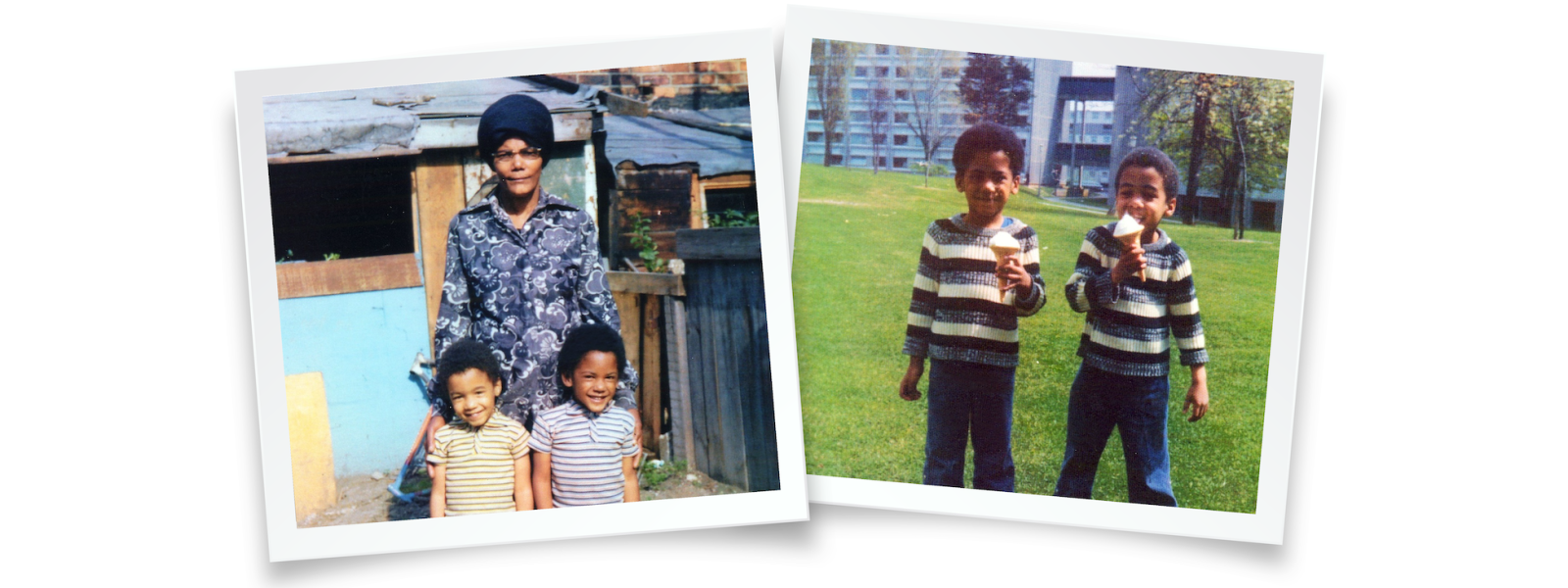Ripple Effects: Reclaiming Our Stories

In this blog, Chris Frederick, a Lived Experience Advisor, explores how his life has been shaped by the intergenerational and historical trauma experienced by his family and within black communities. In honour of Black History Month, Chris traces the connections between the Windrush Generation, the Brixton riots, and the rise of Black mental health advocacy in the 21st century, highlighting the ongoing work of black communities to address health inequalities and tackle mental health stigma.
As Black History Month 2024 invites us to ‘Reclaim Narratives,’ I reflect on my own family’s journey and its lasting effects on my identity and mental health. My mother arrived from Grenada at 16, while my father, the eldest of five, emigrated from Dominica at just eight years old. Both faced the challenges of building a life in a foreign land.
They met at school when they were both about 18, and within two years, they became parents to twin boys—Colin and me. My mother immediately went to work as a nurse, embodying the strong work ethic that many immigrant families uphold. Meanwhile, my father juggled part-time work while studying for his degree, stepping into the role of a patriarch at a remarkably young age after losing his own mother, who was a formidable presence in his life.
Looking back, I can now grasp the immense pressure my father faced as a young father of two, juggling work and studies. His own upbringing under a domineering mother shaped a parenting style rooted in fear and aggression, patterns that rippled through our home. This cycle of trauma is tragically familiar to many black families. Passed down through generations, it reflects the emotional scars left by systemic oppression, displacement, and the struggle to belong in a hostile environment.
At 54, I am only just beginning to understand the layers of pain, resilience, and survival that have shaped my family’s narrative. As I reflect on these experiences, I find myself contemplating whether I still seek an explanation or an apology for the past. Perhaps it is not necessary anymore; instead, I focus on the ripple effects of these experiences, recognising how they have influenced not just my life but the lives of generations to come.
This personal history serves as a powerful reminder that the challenges faced by black communities today are deeply rooted in historical contexts. As we move forward, it is vital to explore how these narratives can be reclaimed to foster understanding, empathy, and ultimately, solutions for health disparities that persist across generations.
The weight of history
The Windrush generation (1948–1971)
With the arrival of Caribbean immigrants to the UK after WWII, invited to help rebuild the country. Many faced racism, housing discrimination, and economic struggles. Despite systemic racism and displacement, the Windrush generation built strong community support systems. Churches, social clubs, and local organizations became central to mental and emotional wellbeing. Over time, this generation pushed for civil rights, anti-discrimination laws, and increased representation in politics and media. Younger generations of black Brits are still influenced by these struggles, shaping their perspectives on identity, mental health, and belonging. This history also informs present-day movements for equality and justice.
The Brixton Riots (1981) and beyond
As tensions between black communities and the police came to a head in Brixton, triggered by long-standing systemic discrimination and poor economic conditions. It was a significant moment of resistance against institutional racism in the UK. The riots forced the British government to confront racial inequality, leading to the Scarman Report, which acknowledged institutional racism, though reforms were slow. These events galvanized black communities to create their own support networks, from social justice groups to mental health advocacy organizations. Today’s racial justice movements, like protests after the death of George Floyd, draw on this legacy, emphasizing the need for mental health support in Black communities facing discrimination and violence.
The Rise of black mental health advocacy (2000s–Present)
In the last two decades, mental health has become a more visible issue within the black community. Racism, discrimination, and intergenerational trauma are now recognised as factors contributing to mental health disparities. This recognition has led to an increase in community-based mental health organisations, particularly by and for black people, aimed at addressing the need for more culturally competent care in the NHS. Movements like Mind’s ‘Time to Change’ campaign and Black Lives Matter have increasingly linked racial justice with mental health, advocating for both systemic change and community-driven solutions.
Conclusion: Reclaiming our future
The ripple effects of the past serve as a constant reminder of both how far we have come and how far we have yet to go. Today, black communities continue to face health inequalities, mental health stigma, and the lingering impacts of historical trauma. To reclaim our future, community-led health initiatives must work in partnership with existing systems to drive real change. We must highlight and support black-led organizations that are already reducing health disparities through education, advocacy, and culturally competent care.
 About the author: Chris Frederick is a mental health advocate and expert in black suicide prevention. As Principal Investigator for Project Soul Stride, he blends lived experience and storytelling—often as the “Mental Health Jedi”—to drive transformative change. The banner features personal photos of Chris and his family, shared from his personal archive.
About the author: Chris Frederick is a mental health advocate and expert in black suicide prevention. As Principal Investigator for Project Soul Stride, he blends lived experience and storytelling—often as the “Mental Health Jedi”—to drive transformative change. The banner features personal photos of Chris and his family, shared from his personal archive.
